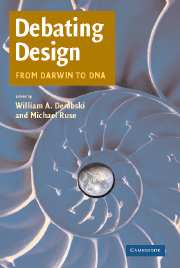Book contents
- Frontmatter
- Contents
- Notes on Contributors
- Debating Design
- INTRODUCTION
- PART I DARWINISM
- PART II COMPLEX SELF-ORGANIZATION
- 8 Prolegomenon to a General Biology
- 9 Darwinism, Design, and Complex Systems Dynamics
- 10 Emergent Complexity, Teleology, and the Arrow of Time
- 11 The Emergence of Biological Value
- PART III THEISTIC EVOLUTION
- PART IV INTELLIGENT DESIGN
- Index
- References
9 - Darwinism, Design, and Complex Systems Dynamics
Published online by Cambridge University Press: 05 June 2012
- Frontmatter
- Contents
- Notes on Contributors
- Debating Design
- INTRODUCTION
- PART I DARWINISM
- PART II COMPLEX SELF-ORGANIZATION
- 8 Prolegomenon to a General Biology
- 9 Darwinism, Design, and Complex Systems Dynamics
- 10 Emergent Complexity, Teleology, and the Arrow of Time
- 11 The Emergence of Biological Value
- PART III THEISTIC EVOLUTION
- PART IV INTELLIGENT DESIGN
- Index
- References
Summary
THE ARGUMENT FROM INCREDULITY
When Saint Augustine was a young man he could not imagine how evil could possibly have come into the world. Later, he came to realize that this line of questioning was dangerous and could bring religion into disrepute (Confessions VI, Chapter 5; VII, Chapters 3–5). His was a wise realization. ‘How possibly’ types of questions may do effective rhetorical work in the early stages of a line of inquiry or argumentation, but the types of answers they engender are open to refutation by the answers to other types of questions, such as ‘why actually’ or ‘why necessarily’ questions. ‘Why actually’ questions – or at least an important class of them that are asked by scientists – have a remarkable way of shutting down ‘how possibly’ questions.
When looking at the functional complexity of the living world, ‘how possibly’ questions emerge rather intuitively. As Michael Ruse has pointed out, the traditional argument from design actually has two steps (Ruse 2002). The first move is from observed functional complexity to the notion that such phenomena appear to have been designed, the argument to design. During this process, alternative, natural explanations are rejected using the criterion of incredulity: how possibly could the vertebrate eye appear as a result of random events, even under natural processes and laws? This was the line of argument taken by William Paley some two centuries ago (Paley 1802).
Information
- Type
- Chapter
- Information
- Debating DesignFrom Darwin to DNA, pp. 173 - 190Publisher: Cambridge University PressPrint publication year: 2004
References
Accessibility standard: Unknown
Why this information is here
This section outlines the accessibility features of this content - including support for screen readers, full keyboard navigation and high-contrast display options. This may not be relevant for you.Accessibility Information
- 8
- Cited by
